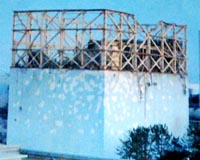 |
Madrid (AFP) March 15, 2011 A Spanish environmental umbrella group urged the government Tuesday to close the country's oldest nuclear reactor following the accident at what it described as its "twin" atomic power plant in Japan. Ecologists in Action called for a demonstration on Thursday in Madrid to demand the closure of the plant at Garona in northern Spain and for a "sensible" timetable to shut down the country's five other reactors. "The plant at Fukushima I is the twin to that of Garona," the confederation of some 300 ecological groups said in a statement. "For Ecologists in Action, what happened in Japan marks a before and after for nuclear power plants," it said. "No one can seriously argue that Garona -- which is in worse shape than was (Japan's) Fukushima I plant -- can continue to operate for several more years," the statement warned. Spain's Socialist Prime Minister Jose Luis Rodriguez Zapatero vowed during general elections in 2004 and 2008 to gradually phase out nuclear power when the lifespan of the country's six nuclear plants expired. But he has since softened his stance, and in July 2009 the government said it would extend the operating licence for the Garona plant for another two years until July 2013. Built in 1971, it is the country's oldest nuclear reactor. Since the nuclear crisis in Japan, Zapatero has made no mention of the atomic power plants. On Tuesday, he met with the head of Spain's Nuclear Security Council, Carmen Martinez Ten, "to look into the Japanese situation," a government spokesman said. Japan's nuclear crisis escalated Tuesday as two more blasts and a fire rocked the quake-stricken Fukushima power plant, sending radiation up to dangerous levels. Greenpeace on Sunday also urged the Spanish government to stick to its promise to close the country's nuclear plants in the wake of the crisis in Japan. "What has happened in Japan reminds us that nuclear energy is very dangerous, even when it is developed in a highly advanced country like Japan," Carlos Bravo, director of Greenpeace's anti-nuclear campaign in Spain, told public television TVE.
earlier related report "In the light of what happened in Japan, we must be very meticulous," Hsieh Teh-chih, deputy chief of the Atomic Energy Council, told AFP. "We'll speed up the review." State-run Taiwan Power Co (Taipower), which operates three nuclear power plants and is building a fourth, kicked off its review of the plants' ability to withstand earthquakes in November. The company said it hopes the review, including a fresh geological survey for the nuclear plants, will take only 28 months, or 12 months less than originally scheduled. The decision to speed up the process came as Japan battled a nuclear crisis at its Fukushima Number 1 plant, with four explosions hitting the site over three days following Friday's 8.9-magnitude quake and the resulting tsunami. Taipower called for calm, saying that compared with the ill-fated Japanese plant, its nuclear power plants were equipped with three more back-up power generators designed to pump water to cool reactors in case of emergency. "The odds of a similar incident happening in our plants will be way below," Chen Pu-tsan, the chief of Taipower's Department of Nuclear Safety, told reporters. Chen added that Taipower's nuclear power plants -- three in the north and one in the south -- are thought to be safer than the Japanese plant because they are on higher ground, boosting their chances of surviving any tsunami. "The information available shows that the major damage caused to the Fukushima plant was from the ensuing tsunami rather than the earthquake," Chen said. The incidents have caused fears over Taiwan's nuclear power sector, as the island, like Japan, is in an earthquake-prone part of the Pacific basin. "Initially, the public was concerned if radiation levels would rise in the wake of the damage in Japan," the leading opposition Democratic Progressive Party said in a statement. "Now people here are worrying about the safety of Taiwan's own nuclear power plants." The party demanded that the government brief the people about measures it would take if similar incidents took place in Taiwan. Authorities in the greater Taipei area, which houses two nuclear power plants, said they would hold an evacuation drill in May to simulate measures to be taken in a nuclear crisis. Taipower has said it plans to keep its three existing nuclear power plants operating for 20 more years after their current licences expire in a bid to help control global warming. The operating licence of its first nuclear power plant is due to expire in 2017. Electricity generated by the three nuclear power plants accounts for 20 percent of the island's power supply.
Share This Article With Planet Earth
Related Links Nuclear Power News - Nuclear Science, Nuclear Technology Powering The World in the 21st Century at Energy-Daily.com
 Plant operator says reactor seal apparently not holed
Plant operator says reactor seal apparently not holedTokyo (AFP) March 15, 2011 The seal around a reactor at a quake-damaged Japanese nuclear power plant does not appear to have been holed, the plant operator said Tuesday, following an explosion at the plant. Chief Cabinet Secretary Yukio Edano told reporters earlier that the suppression pool of the number-two reactor at the Fukushima No.1 plant appeared to have been damaged. The pool forms the base of the containe ... read more |
|
| The content herein, unless otherwise known to be public domain, are Copyright 1995-2010 - SpaceDaily. AFP and UPI Wire Stories are copyright Agence France-Presse and United Press International. ESA Portal Reports are copyright European Space Agency. All NASA sourced material is public domain. Additional copyrights may apply in whole or part to other bona fide parties. Advertising does not imply endorsement,agreement or approval of any opinions, statements or information provided by SpaceDaily on any Web page published or hosted by SpaceDaily. Privacy Statement |